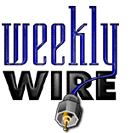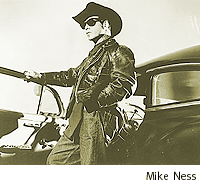Review
MTV Interview
Weekly Wire
Web Moment

Social Distortion's Mike Ness Headlines The Annual Independence Day Jamboree At Club Congress.
By Stephen Seigel - July 1999
IN 1982, A pack of punk rock kids from Orange County, California, loaded up a broken-down school bus they had bought with money raised by playing a single local gig, and set out on an ambitious tour. The posse consisted of the Mike Ness-led Social Distortion, who had only released a small batch of 7-inch singles on the Posh Boy label at the time; Youth Brigade, founders/owners of the Better Youth Organization (B.Y.O.), which served as both record label and promotion medium for positive values in the punk community; and various other characters defined loosely as "roadie" or "mechanic."
 The bands had scheduled 25 shows over four-and-a-half weeks and
10,000 miles, covering both the U.S. and Canada, and had booked
all of the shows themselves, relying on the fans in each town
they were to hit to handle promotions. And while all of the shows
on the tour were well-attended, the bands found themselves getting
ripped off at the door, suffering through chronic bus breakdowns,
and enduring massive infighting. (Try spending a month on a seatless
school bus with a dozen broke, hungry, testosterone-soaked punk
rockers.)
The bands had scheduled 25 shows over four-and-a-half weeks and
10,000 miles, covering both the U.S. and Canada, and had booked
all of the shows themselves, relying on the fans in each town
they were to hit to handle promotions. And while all of the shows
on the tour were well-attended, the bands found themselves getting
ripped off at the door, suffering through chronic bus breakdowns,
and enduring massive infighting. (Try spending a month on a seatless
school bus with a dozen broke, hungry, testosterone-soaked punk
rockers.)
Eventually, in Washington, D.C., the bus broke down for the final time, and the remaining tour dates were cancelled.
Luckily, the entire tour was being recorded by prescient video/filmmakers Peter Stuart and Adam Small, who were following the entourage in a reliable rental truck--otherwise, they may never have gotten home. The resulting document of their travails is called Another State of Mind (available on video through Time Bomb Filmworks), and it, in retrospect, quaintly reveals a time in American music history now gone--the days when a couple of virtually unknown (mostly teenage) punk bands would spend their summer vacation piling into a decrepit, overcrowded school bus simply for the love of the music, the opportunity to travel, and perhaps most importantly, because they felt like they didn't fit in with the new morality codes and trickle-down economics of the Reagan era, especially as they witnessed the crumbling of the sacred family unit around them.
"What's interesting to me is why these kids got involved in punk music," says Ness today. "It's very similar to why kids get involved in gangs--there's stuff lacking in the home. It was music that we identified with, and we identified with it for a reason, whereas (a lot of) bands today are just hopping on a trend."
Asked if the hard-edged bands of today aren't filling the same void that the original crop of punk bands filled for him, Ness is skeptical. "I don't think so. I don't see how it could, 'cause the music I was listening to as a teenager had so much social significance, and this stuff like Korn just doesn't. There were socio-economics involved (then). It was a rebellion; it was a revolution. This isn't--this is a multi-million-dollar industry."
So what does he think of bands like Korn? "I try really hard not to. I call it the Harley-Davidson syndrome. In the old days, you had bikers, and now you have corporate executives riding brand new Harleys 'cause they want to be a part of it, but through the translation things have become diluted and homogenized and accessible. It's like the whole tattoo thing, too. I mean, I got tattoos for purely anti-social reasons, and now people do it for social acceptance. It's a weird thing. I miss the individualism. Record labels are signing bands who sound just like whoever's on top of the charts right now. It's pathetic."
While Korn's shelf life remains to be seen, Ness' legacy already looms large: while most of the bands of that era are only to be found as footnotes in the great history of rock music, Social Distortion is still together and thriving. "There were thousands of bands that started when I did, and I don't know why only a handful remain," muses Ness. "But I do know that there's a difference between talent and passion, and that's why I've been able to do this for 20 years. I have a passion for it. It's a way of life for me."
But Ness' passions aren't limited to the often strict lines of punk rock. His music has always been accessible, favoring homegrown pop-punk melodies and traditional guitar solos, albeit with a sharp edge, while other bands were competing for sheer aggression and break-neck speed. And Social Distortion's output only grew closer to rock's roots as time went by.
So it was somewhat of a stunner when the band released White Light, White Heat, White Trash in 1996, its most "punk" LP since the band's debut, 1983's Mommy's Little Monster.
"I just kind of wanted to reconnect that circle," Ness says. But shortly after the release, Ness decided he needed a break from Social Distortion, some time to rediscover the music that had made him so passionate in the first place.
"I was born in 1962, and I grew up listening to everything from the '60s on up to the '90s. I mean, that's 37 years of music. The punk thing was only the last...well, I cut off my hair in 1979," remembers Ness. "I was 17 years old, but I had been listening to music for that 17 years. I grew up with the Rolling Stones and Creedence Clearwater and Depression-era folk music and Johnny Cash. I feel like, in the late '70s, I temporarily abandoned that because it wasn't 'in the moment,' but by the early '80s I had re-embraced them, because at some point I saw the connection between American roots music and punk music. American roots music was the first voice of rebellion. I mean look at Johnny Thunders or the Dead Boys or the Ramones or X, and they all have American iconisms throughout their music. The Sex Pistols album (Never Mind the Bollocks...Here's the Sex Pistols) is laced with Chuck Berry, but I guess some people just can't see beneath the surface."
Whether it's an attempt to reconnect with his roots or a reaction against the punk revisitation of the last Social Distortion record, Ness recently released his first collection of solo material, Cheating At Solitaire (Time Bomb Recordings), currently riding the modern rock charts. Which is kind of ironic, considering that it's his rootsiest effort to date.
"What I had to make sure of with this record," says Ness, "is that it didn't somehow become retro, and I also didn't want to make one of those 'contemporary-roots' albums, because I think roots music of today is completely homogenized too, just like punk. I mean, Garth Brooks is not country."
And if he had to describe Cheating At Solitaire on his résumé, how would the job description read? "With Social Distortion I brought American roots music to punk. With this record I tried to bring elements of punk to roots to make it real again. The main focus was to be rootsy without being retro."
From Cheating At Solitaire's opener "The Devil in Miss Jones," a modern take on traditional Western music (in which Ness' sandpaper growl intones, "Give me your heart/Give me your soul" in place of the trusty "Yippie-yi-ay/Yippie-ay-oh"), to the rockabilly shuffle of "Crime Don't Pay" (featuring guest guitar from Brian Setzer), to the beautifully mournful, mandolin-laced ballad "If You Leave Before Me," to " Ballad of a Lonely Man," which could easily be a long-lost Johnny Cash tune, the only thing that Cheating At Solitaire has in common with punk rock is attitude. And passion.
 In addition to 11 Ness originals, the album contains four covers,
including Hank Williams' "You Win Again" and Bob Dylan's
"Don't Think Twice, It's All Right," which is all over
alternative radio right now. And in addition to Setzer's guest
spot, a couple of other notables show up on Solitaire as
well: X guitarist Billy Zoom sits in on "Dope Fiend Blues"
(a problem Ness took care of in the '80s--he's been clean and
sober for 14 years now), Royal Crown Review provides the sax and
rhythm all over the record, and a fellow you may have heard of,
one Bruce Springsteen, swaps verses and guitar licks with Ness
on "Misery Loves Company." Which raises the question:
How do you get Bruce Springsteen to sing and play on your first
solo record, even if you are Mike Ness?
In addition to 11 Ness originals, the album contains four covers,
including Hank Williams' "You Win Again" and Bob Dylan's
"Don't Think Twice, It's All Right," which is all over
alternative radio right now. And in addition to Setzer's guest
spot, a couple of other notables show up on Solitaire as
well: X guitarist Billy Zoom sits in on "Dope Fiend Blues"
(a problem Ness took care of in the '80s--he's been clean and
sober for 14 years now), Royal Crown Review provides the sax and
rhythm all over the record, and a fellow you may have heard of,
one Bruce Springsteen, swaps verses and guitar licks with Ness
on "Misery Loves Company." Which raises the question:
How do you get Bruce Springsteen to sing and play on your first
solo record, even if you are Mike Ness?
"I had met him a couple of times, and he's a huge Social Distortion fan. So we just called him up 'cause I knew if he liked that, he was gonna love this. And he did. I think we have similar roots. He may not be a big Clash fan, or Dead Boys or Ramones fan, I mean, I don't know. But I'll tell ya what, I know he loves Woody Guthrie and Leadbelly, and all those other...pioneers of music."
"It was really neat that I had all these people who wanted to be a part of this project right away," says Ness. "They heard about it, they were excited about it, they didn't want any money for it, they just wanted to do it. Same goes for Brian Setzer."
Ness is out on the road these days with a newly assembled band, playing a couple of Social Distortion songs per show, but mainly keepin' it real by playing most of Cheating At Solitaire. "I grew up in Social Distortion, so it still has to rock. It's gotta have biting vocals, and biting guitars, and biting drums in it, and a bass that hits you in the chest. But people should definitely not expect a Social Distortion show; however, they should also not expect a quiet sit-down, folksy evening either."
Mike Ness performs at Club Congress, 311 E. Congress St., on Friday, July 2, 1999 on a bill that also includes Reverend Horton Heat, Deke Dickerson and the Ecco-phonics, Custom Made Scare, and Thunderosa. Doors open at 8 p.m. Tickets are $20 at the door. For more information call 622-8848.